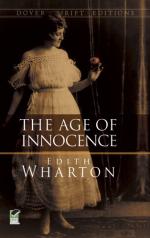“Well, then: is it worth while to risk what may be infinitely disagreeable and painful? Think of the newspapers—their vileness! It’s all stupid and narrow and unjust—but one can’t make over society.”
“No,” she acquiesced; and her tone was so faint and desolate that he felt a sudden remorse for his own hard thoughts.
“The individual, in such cases, is nearly always sacrificed to what is supposed to be the collective interest: people cling to any convention that keeps the family together—protects the children, if there are any,” he rambled on, pouring out all the stock phrases that rose to his lips in his intense desire to cover over the ugly reality which her silence seemed to have laid bare. Since she would not or could not say the one word that would have cleared the air, his wish was not to let her feel that he was trying to probe into her secret. Better keep on the surface, in the prudent old New York way, than risk uncovering a wound he could not heal.
“It’s my business, you know,” he went on, “to help you to see these things as the people who are fondest of you see them. The Mingotts, the Wellands, the van der Luydens, all your friends and relations: if I didn’t show you honestly how they judge such questions, it wouldn’t be fair of me, would it?” He spoke insistently, almost pleading with her in his eagerness to cover up that yawning silence.
She said slowly: “No; it wouldn’t be fair.”
The fire had crumbled down to greyness, and one of the lamps made a gurgling appeal for attention. Madame Olenska rose, wound it up and returned to the fire, but without resuming her seat.
Her remaining on her feet seemed to signify that there was nothing more for either of them to say, and Archer stood up also.
“Very well; I will do what you wish,” she said abruptly. The blood rushed to his forehead; and, taken aback by the suddenness of her surrender, he caught her two hands awkwardly in his.
“I—I do want to help you,” he said.
“You do help me. Good night, my cousin.”
He bent and laid his lips on her hands, which were cold and lifeless. She drew them away, and he turned to the door, found his coat and hat under the faint gas-light of the hall, and plunged out into the winter night bursting with the belated eloquence of the inarticulate.
XIII.
It was a crowded night at Wallack’s theatre.
The play was “The Shaughraun,” with Dion Boucicault in the title role and Harry Montague and Ada Dyas as the lovers. The popularity of the admirable English company was at its height, and the Shaughraun always packed the house. In the galleries the enthusiasm was unreserved; in the stalls and boxes, people smiled a little at the hackneyed sentiments and clap-trap situations, and enjoyed the play as much as the galleries did.




